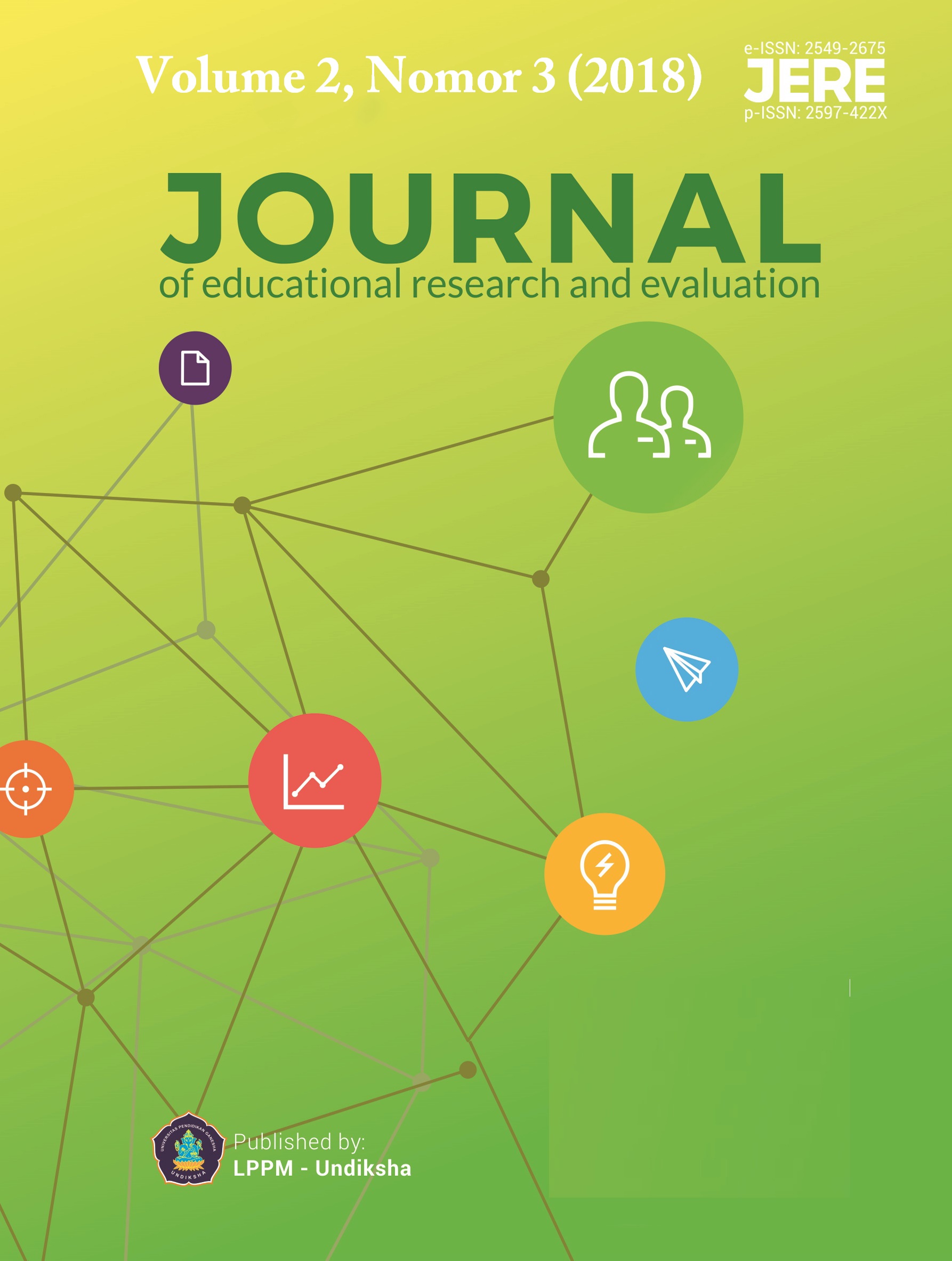The Effect of Circuit Training Methods, Circuit Series and Learning Motivation on Students’ Volleyball Basic Skill
DOI:
https://doi.org/10.23887/jere.v2i3.14467Keywords:
Latihan sirkuit, rangkaian bermain, motivasi belajar, keterampilan teknik dasar bolavoliAbstract
This research was conducted to reveal the influence of circuit training methods, circuit series and learning motivation on basic volleyball technical skills of students of Bung Hatta University Health and Recreation Health and Education Study Program, Bung Hatta University. The purpose of this study is to analyze the differences of the influence of circuit training methods and circuit series and to see students' learning motivation towards their basic skills of volleyball. This research was conducted at Bung Hatta University volleyball court. This study was a quasi experiment with quantitative approach. The technique of data analysis was t-test. Based on the results of data analysis, it was found that: 1) there was a significant effect between the method of circuit training on volleyball basic technical skills with tcount = 16.90 and ttable = 2.20; 1) there was a significant influence between the circuit series method on the basic skills of volleyball with tcount = 9.62 and ttable = 2.20; 3) student learning motivation variables obtained the achievement level of 76.52%. This means that students have good learning motivation in following basic volleyball skills training, which is in the good category.
References
A.M. Sardiman, 2007, Interaksi dan Motivasi Belajar Mengajar: Bandung, Rajawali Pers.
Ahmad Adib An’Amta dan Nurhikmahyanti Desi. 2014. Hubungan Motivasi Belajar Olahraga Dan Sarana Prasarana Keolahragaan Terhadap Prestasi Belajar Siswa Cabang Olahraga Voli Pantai Di Upt Sma Negeri Olahraga Provinsi Jawa Timur. Jurnal Inspirasi Manajemen Pendidikan, Vol. 3 No. 3.
Astuti Yuni 2017. Pengaruh Metode Drill dan Metode Bermain Terhadap Keterampilan Bermain Bolavoli Mini (Studi Eksperimen Pada Siswa SD Negeri 14 Kampung Jambak Kecamatan Koto Tangah Kota Padang). Jurnal Al Ibtida. Vol 4 No. 1.
Barzouka K., Sotiropoulos, K., Kioumourtzoglou, 2015. The effect of feedback through an expert model observation on performance and learning the pass skill in volleyball and motivation. Journal of Physical Education and Sport ® (JPES), 15(3), Art 61, pp. 407 - 416
Dimyati, 2006. Belajar dan Pembelajaran, Jakarta: Rineke Cipta.
Erianti. 2011. Buku Ajar Bolavoli. Padang: FIK UNP.
Harsono. 1988. Prinsip-Prinsip Pelatihan. Jakarta: Depdikbud Dirjen Dikti P2LPTK.
Hendri Irawadi. 2010. Kondisi Fisik dan Pengukurannya. Padang: FIK Universitas Negeri Padang.
Hidayat Akhmad Slamet Nur. 2015. Peningkatan Pembelajaran Servis Atas Bolavoli. Melalui Metode Team Games Tournament Kelas Xi Mia 5 Sman 1 Sleman. Jurnal Pendidikan Jasmani Indonesia. Volume 11, Nomor 2, November 2015.
Khairul Hadziq. 2013. Pendidikan Jasmani Olahraga dan Kesehatan SMP/MTS Kelas VII. Jakarta: Rama Widya.
Malik Arief Abdul, dkk. 2013. “Ular Tangga Olahraga” Media Permainan Edukatif Untuk Olahraga Dengan Menggunakan Sistem Sirkuit Training Bagi Siswa Kelas X Sma Negeri Ajibarang Tahun Journal of Physical Education, Sport, Health and Recreation (2).
Margiyani. 2008. Pendidikan Jasmani, Olahraga, dan Kesehatan Kls. 4 SD/MI. Jakarta: Bumi Aksara.
Saptono Tri. 2013. Perbedaan Pengaruh Metode Mengajar Reciprocal Dan Self Check Terhadap Peningkatan Keterampilan Teknik Dasar Bolavoli. Jurnal Pendidikan Jasmani Indonesia. Volume 9, Nomor 2.
Sri Wahyuni. 2013. Pendidikan Jasmani, Olahraga dan Kesehatan SMA/MA. Semester 1. Jakarta: Tiga Serangkai Pustaka Mandiri.
Surtiyo. 2013. PJOK (Pendidikan Jasmani, Olahraga dan Kesehatan SMP/MTS. Jakarta: PT Bumi Aksara.
Syafruddin. 2004. Permainan Bolavoli. Padang.: FIK UNP.
Syafruddin. 2011. Ilmu Kepelatihan Olahraga. Padang; UNP Press.
Zan Gao, Leslie Podlog, Chaoqun Huang. 2012. Associations among children’s situational motivation, physical activity participation, and enjoyment in an active dance video game. Journal of Sport and Health Science (2) 122-128.
Downloads
Published
How to Cite
Issue
Section
License
Authors who publish with the Journal of Evaluation and Research in Education (JERE) agree to the following terms:
- Authors retain copyright and grant the journal the right of first publication with the work simultaneously licensed under a Creative Commons Attribution License (CC BY-SA 4.0) that allows others to share the work with an acknowledgment of the work's authorship and initial publication in this journal.
- Authors are able to enter into separate, additional contractual arrangements for the non-exclusive distribution of the journal's published version of the work (e.g., post it to an institutional repository or publish it in a book), with an acknowledgment of its initial publication in this journal.
- Authors are permitted and encouraged to post their work online (e.g., in institutional repositories or on their website) prior to and during the submission process, as it can lead to productive exchanges, as well as earlier and greater citation of published work. (See The Effect of Open Access)











